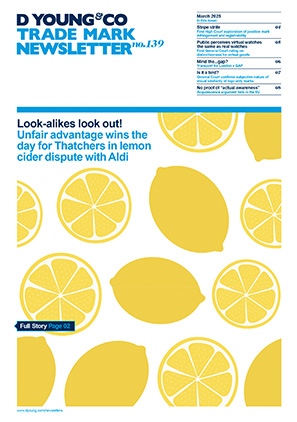Ex “Slaughter and The Dogs” band members contest goodwill in a band name
After “unusually lengthy” and “emotionally charged” proceedings that were “be-set with procedural issues”, the UK Intellectual Property Office (UKIPO) concluded that goodwill in the band name of an English punk rock band from the 1970s resided with the “last men standing”.
Wayne Barrett McGrath, original member of Slaughter and The Dogs, applied for UK trade mark no. 3333426 “Slaughter and the Dogs” in his own name on 22 August 2018, which was registered on 16 November 2018, for goods in class 9 relating to music.
Howards Bates, an original member of the band alongside Wayne Barrett McGrath, applied to invalidate the trade mark on the basis of passing off. Mick Rossi, another original band member, claimed that the name “Slaughter and The Dogs” had been used throughout the UK since 1975, had acquired its own goodwill, and that each band member acquired an undivided share in that goodwill.
Chronology of events
- Slaughter and The Dogs was formed in Manchester in 1975. The original line-up was Howard Bates (bass), Wayne Barrett McGrath (singer), Mick Rossi (lead guitar) and Brian Grantham (drummer).
- Slaughter and The Dogs released their first album “Do It Dog Style” in 1978.
- Slaughter and The Dogs ceased to exist briefly at the end of 1978 and reformed in 1979 with Philip Rowland replacing Brian Grantham.
- Wayne Barrett McGrath left the band sometime after a new recording contract was signed in 1979. Ed Garrity replaced him.
- Howard Bates, Mick Rossi, Ed Garrity, and Philip Rowland released an album in 1980 under the name “Slaughter” titled “Bite Back”.
- There was some activity from the band between 1980 and 2015, although evidence for this period was scant.
- In 2015 and 2016 the original band members (Barrett McGrath, Rossi, Bates and Grantham) performed together at a gig in Manchester and at the Rebellion Festival in Blackpool.
Evidence pitfalls
Neither side was represented by legally qualified representatives (save that Howard Bates was represented by counsel at the final hearing). As a result, the proceedings were beset by procedural issues, and involved three case management conferences and several case direction letters. In particular, large parts of Wayne Barrett McGrath’s evidence was not considered by the hearing officer when making the decision. It is also worth noting that neither side elected to cross-examine the other.
First, Wayne Barrett McGrath did not follow the rules for the evidence phase and submitted pieces of evidence outside of the evidence deadline, via email, and not under the cover of a witness statement.
Further, Wayne Barrett McGrath’s evidence attacked the credibility of witness statement evidence submitted by Howard Bates. In particular, in response to a witness statement from Maurice Murray, the band’s promoter between 2002 and 2016, Wayne Barrett McGrath claimed that Maurice Murray “makes up stories” and had “defamed himself and his wife”. The hearing officer found that these claims were baseless and noted that defamation is not dealt with by the tribunal. Wayne Barrett McGrath also made numerous submissions pertaining to Howard Bates’ involvement in businesses other than the band. The hearing officer did not consider this relevant and found no reason why Howard Bates could not be involved in another company and be in the band at the same time.
Much of the evidence submitted by Howard Bates contradicted some of the statements made by Wayne Barrett McGrath. For instance, Wayne Barrett McGrath claimed that merchandise created for gigs in 2015 and 2016 was “not approved” and “considered illegal merchandise”. However, the hearing officer was presented with evidence of Wayne Barrett McGrath wearing the merchandise, as well as attending a stand at which the band’s official merchandise was being sold in order to sign autographs.
Overall, these evidence pitfalls did not help Wayne Barrett McGrath’s case, and certainly did not assist when it came to costs.
Decision
Turning to the passing off assessment, the hearing officer found that goodwill had been created by the band, and would have likely been revived by the gigs performed in 2015 and 2016. The crux of the dispute, however, was the ownership of the goodwill. From the evidence, it appeared that the band had three different line-ups up until 1980 when the first phase of the band ceased to exist:
- Wayne Barrett McGrath, Howard Bates, Mick Rossi and Brian Grantham: first recording contract and first album (1978).
- Wayne Barrett McGrath, Howard Bates, Mick Rossi and Philip Rowland: second recording contract (1979).
- Howard Bates, Mick Rossi, Philip Rowland and Ed Garrity: second album after departure of Wayne Barrett McGrath (late 1979-1980).
As established in earlier case law (The Animals O/369/13 and Saxon Trade Mark [2003] FSR 39), in the absence of an agreement members of a band or group who perform for consideration are likely to constitute a partnership-at-will. This means that the assets of the band or group, including its goodwill and therefore rights to its name, are partnership assets to which each member is normally entitled to an undivided share. The hearing officer concluded that each of the band line-ups would have acquired their own goodwill independently of each other.
The goodwill generated for Slaughter and The Dogs should be taken to have been owned by the last men standing in 1980, namely Howard Bates, Mick Rossi, Ed Garrity and Philip Rowland. Clearly, there had been other iterations of the band in the 1990s until the first reunion concert in 2015, however, at no point did any of the last men standing abandon their rights. Whichever iteration of the band is considered to represent the last men standing Howard Bates was part of it, and so he had an undivided share of the goodwill.
Having established goodwill and its ownership the hearing officer briefly dealt with misrepresentation and damage. It was inevitable that the relevant public would believe that the goods are those of the band and damage was easily foreseeable. The fact that Wayne Barrett McGrath was one of the original members did not entitle him to lay claim individually to the whole of the benefit of the goodwill by registering the trade mark for himself. Therefore, Howard Bates succeeded in his invalidation claim.
Costs
The hearing officer found that Wayne Barrett McGrath’s conduct was unacceptable and said that “Mr Bates has been extremely patient throughout these proceedings both in respect of the way he has been addressed by [Mr Barrett McGrath] and in his responses to the many delays in getting this case to a hearing.” Taking all of this into account, the hearing officer awarded Howard Bates all of his costs request, plus the official fees and further awards for his professional representation at the hearing (a total of £4,430).
In short
This decision is a stark reminder for bands to register their names sooner rather than later, and to consider the ownership of band assets early on to avoid costly and lengthy disputes.
This case also highlights the pitfalls of facing a dispute without any legal representation and having to navigate the procedural complexities of evidence and hearings. If involved in a trade mark dispute one should avoid making allegations that are not supported by evidence, and focus should instead be on matters that are key to the issues at hand. Legal representation will help you stay focused and put your best foot forward in any dispute.
Case details at a glance
Jurisdiction: United Kingdom
Decision level: UKIPO
Parties: Howards Bates v Wayne Barrett McGrath
Date: 15 May 2024
Citation: O/0441/24

